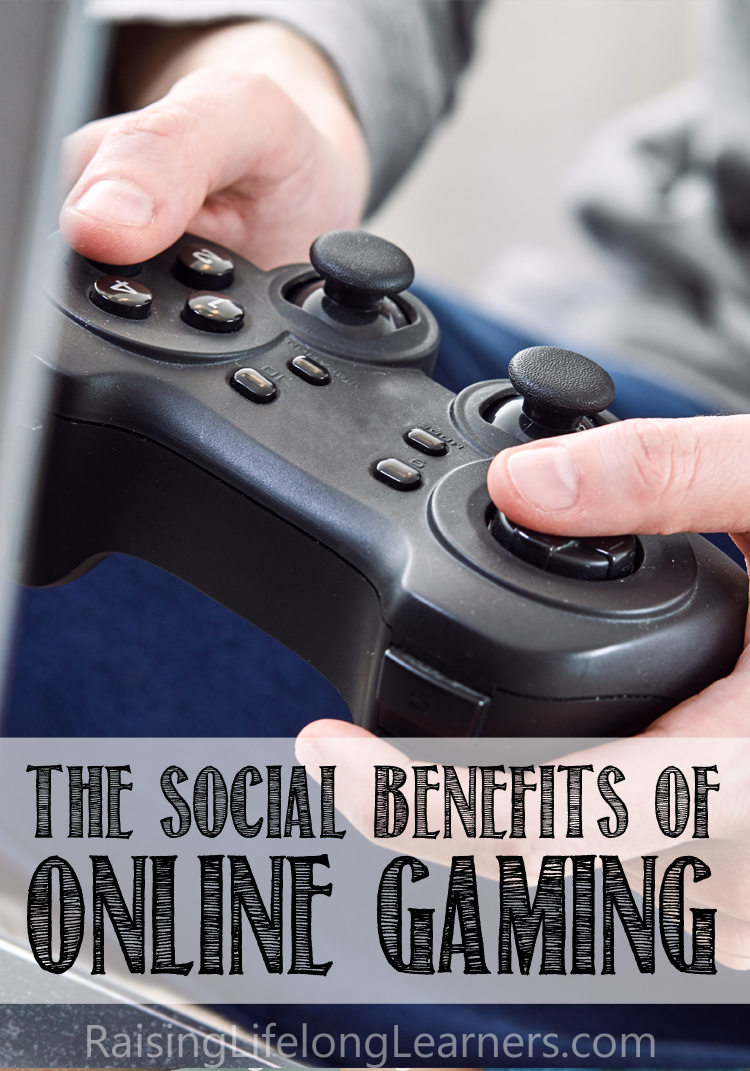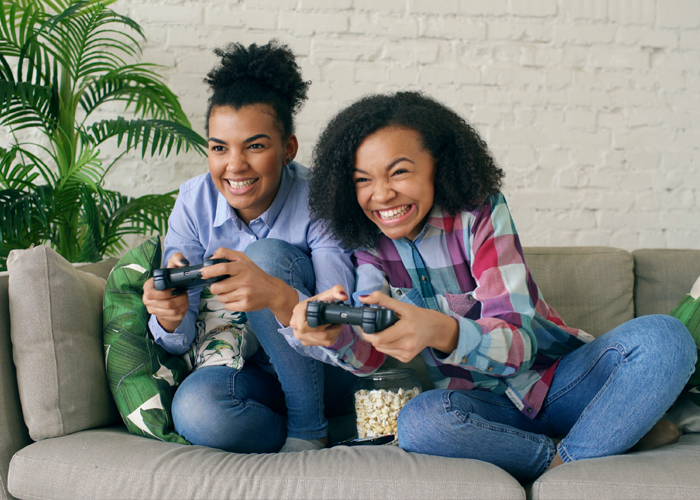The Social Benefits of Online Gaming
There’s a lot of information and opinion out there about online gaming, warning us, the parents, not to let our children rot their brains and spend their days on these video games. The big bad wolf is no longer outside, threatening to blow our house down – it’s behind a screen and a headset, waiting to turn our children to mush and monsters. While I don’t dismiss these studies and warnings wholly and I do recognize that addictions and neuropathways are a real thing to protect and manage, I’m here to tell you instead about how online gaming has helped my child.
You read that right. Online gaming, for all of the horror stories and cautionary tales, has proven to be a benefit in our home.
I’ll go ahead and get it out of the way and defend my parenting – we do not let the kids play unlimited amounts of video games, we have very strict and safe guidelines in place to protect them, and they are always, always supervised by a parent who is in the same room during gameplay.
My kids are differently-wired. While they’re all three gifted, they’re also all three different from each other, and I’ve learned that sharing the label of giftedness does not mean they necessarily share much else. One kid is the most extroverted social butterfly who ever saw the world as a stage. She makes friends everywhere she goes and fits in absolutely anywhere. One kid is decently split, a true ambivert, who isn’t shy or attention-seeking and is perfectly content with his small group of like-minded friends. He meets people easily, is a great conversationalist, and is comfortable in just about any social setting. Then there’s a third kiddo. He’s the most differently-wired of all of them, and he knows it. Social settings have always been awkward for him, and forming relationships has been nearly impossible. He’s introverted, interested in atypical things, asynchronous, intense, and impatient. He’s positively hilarious when you get to know him, but he’s got quite a wall built up around himself and kids his age aren’t typically too interested in scaling it.
Gifted kids, kids who are differently-wired, can often face very painful social struggles. They’re not like the other kids around them, they don’t have a lot in common with their peers. They may have odd interests or struggle to read social cues. They may be so deep in thought that they don’t join conversations or so excited about a single topic that they don’t allow anyone else to join the conversation. Their development is usually asynchronous so they’re discussing topics several years ahead of what you’d expect, using vocabulary kids their age can’t understand, but reacting to others the way a preschooler might. Their emotions can be more intense, they may be more irritated by sensory stimuli, or they may be the exaggerated sensory stimuli. Differently-wired kids are different, and it’s not hard to tell. But it can be hard to befriend.
Related: Navigating Social and Emotional Needs of Gifted Kids , Socialization and Your Gifted or Intense Child
When my kids first started asking about online gaming, I gave them a hard no. Not just a no, a HECK no. I’d heard all of the expert opinions, read plenty of articles, and watched enough Law & Order that I knew I didn’t want my kids exposed to the horrors of the internet. Their brains are beautiful and I could practically picture them melting as soon as they came up with a gamer tag. Nope, not my kids.
But as parenting often goes, I made a lot of declarations that ended up softening into understandings. Once we had multiple conversations about online safety and had plenty of rules in place to protect them and their beautiful brains, we watched some very excited boys use their own money to buy a headset. It was official – the kids were gamers.
One of the rules of online gaming in our home is that the kids must play in the living room with a parent present. This ensures not only that all conversations are wholesome and safe, but also that any rages, frustrations, and general fits could be monitored and deescalated. We’ve instructed them on who they are allowed to accept requests from as well as what information they are allowed to share – and not share. We listen closely (and I end up hearing a lot more about Fortnite than I care to). Because of this listening, I have been privy to every word of my son’s transformation over the last few months.
That socially-awkward kid, the one who struggled with even starting a conversation at church? He now speaks with multiple friends daily. Just months ago he didn’t really have anyone he could call a friend, and today he has several. They’re all real people, boys he’s met in person and already knew prior to online gaming, but had never known how to speak to.
In person he struggled to start conversations. Tween boys aren’t known for their dazzling icebreaker skills, and his obvious differences kept him from approaching others, and others from approaching him. He might be really into basketball statistics or the history of exotic animal laws, so he didn’t have anything in common to talk about with the other kids his age. But while gaming, he is meeting a friend with something in common, something they’re both interested in and want to do. There is an instant and shared connection, no need to painfully poke and prod to find a common hobby. He doesn’t have to fake interest or water his own down – they’re both there to game.
Related: 5 Tips for Helping Gifted Kids Make Friends , Great Gifts for Fortnite Fans
Online gaming has also taught my sweetly awkward boy how to collaborate, how to work as a team. When he was in public school he was so far ahead of his class that he never was able to work on a group project. Not once. When he was playing sports his anxiety and intensity sabotaged his talents and he focused more on players’ slights than his team’s well-being. He’s prone to frustration, and definitely gets a little heated now and then from a game, but these games with kids miles away from him have strengthened his cooperative abilities in a way that still shocks me. Because he is talking with his teammates in the headset, he is forced to practice communication skills, talking out plans with them, discussing what moves to make, requesting help when he needs it. The lone wolf has learned to communicate and participate, step up and fall back as needed. He doesn’t just push his way through a game or quit when it’s not going his way, he’s learning the art of effectively communicating with someone he cannot control. He’s not in charge, he’s not alone – he’s part of a team.
Being able to talk with the other gamers has opened up some opportunities for real discussions he wouldn’t have had otherwise. Because he’s introverted and content to sit alone, and because he’s so intensely different, he doesn’t have a lot of opportunity to just talk with other kids. He’s got a lot of thoughts and feelings and likes sharing them, but again, tween boys aren’t known for their empathetic listening skills. When he’s got the headset on, though, he’s with friends. While waiting for a new round to start or maybe during an easy match I hear him begin to chat – “How do you feel about ___? Do you ever feel like ___? Why do you think ___?” I hear him ask these friends. If they’d been on a basketball court or in the middle of a crowded church service he might not have the opportunity to ask these questions. But when they’re working together on something, when their voices are so close and there’s nowhere to turn to avoid discussion, the talks happen. I listen to him share his feelings. I listen to him share his ideas. I listen to him have friends, real friends. They’re forming connections that go deeper than wifi and last longer than a single turn at a match. These friends, these conversations, are real, even if they take place in front of a screen displaying something that isn’t.
Most importantly, most markedly, online gaming has helped my kiddo belong. Like I said earlier, he knows he’s different. His interests don’t always line up with those of the other kids his age and he has always struggled with social situations. He’s always removed himself from groups, maybe because he prefers it, maybe because he instinctively is protecting himself, but he always ends up alone. These games, though, make him a part of something, give him an instant icebreaker, an automatic connection. He sees the other gamers in person and can strike up a conversation immediately. He can sign in to his account and see a list of people who will be happy to hear from him. He still cares about researching biofuels and the height of every single NBA player ever, but he also can relate to the kids around him because they’re playing the same game he is. He can meet new people in person and carry on a conversation. He can learn new things from other people. He can make a mistake and laugh about it. He can be gloriously unique while still finding a place in the group, and he’s honestly never been happier.
Online gaming is a choice every family makes for themselves, and I recognize that it doesn’t always go so well for everyone, nor is it even welcomed by everyone. But in my family, in my living room, I have been able to witness a transformation and empowerment take place that has boosted my child’s social skills, communication, and most importantly, his self esteem. I have listened to him as he’s grown and watched him as he’s stretched. His brain hasn’t melted, he hasn’t become a rage monster, and his IQ is likely still the same. He hasn’t lost a single part of himself to online gaming – he’s only gained wonderful new skills, as well as wonderful new friends. In fact, for the first time ever, one of those friends came over this week to hang out. A boy he’d known for several years but had never been able to connect with, they formed their friendship over online gaming and have thoroughly enjoyed laughing and talking over the headset together. He’s a real friend now, a friend he never would have made without the confidence and opportunities provided by online gaming.




